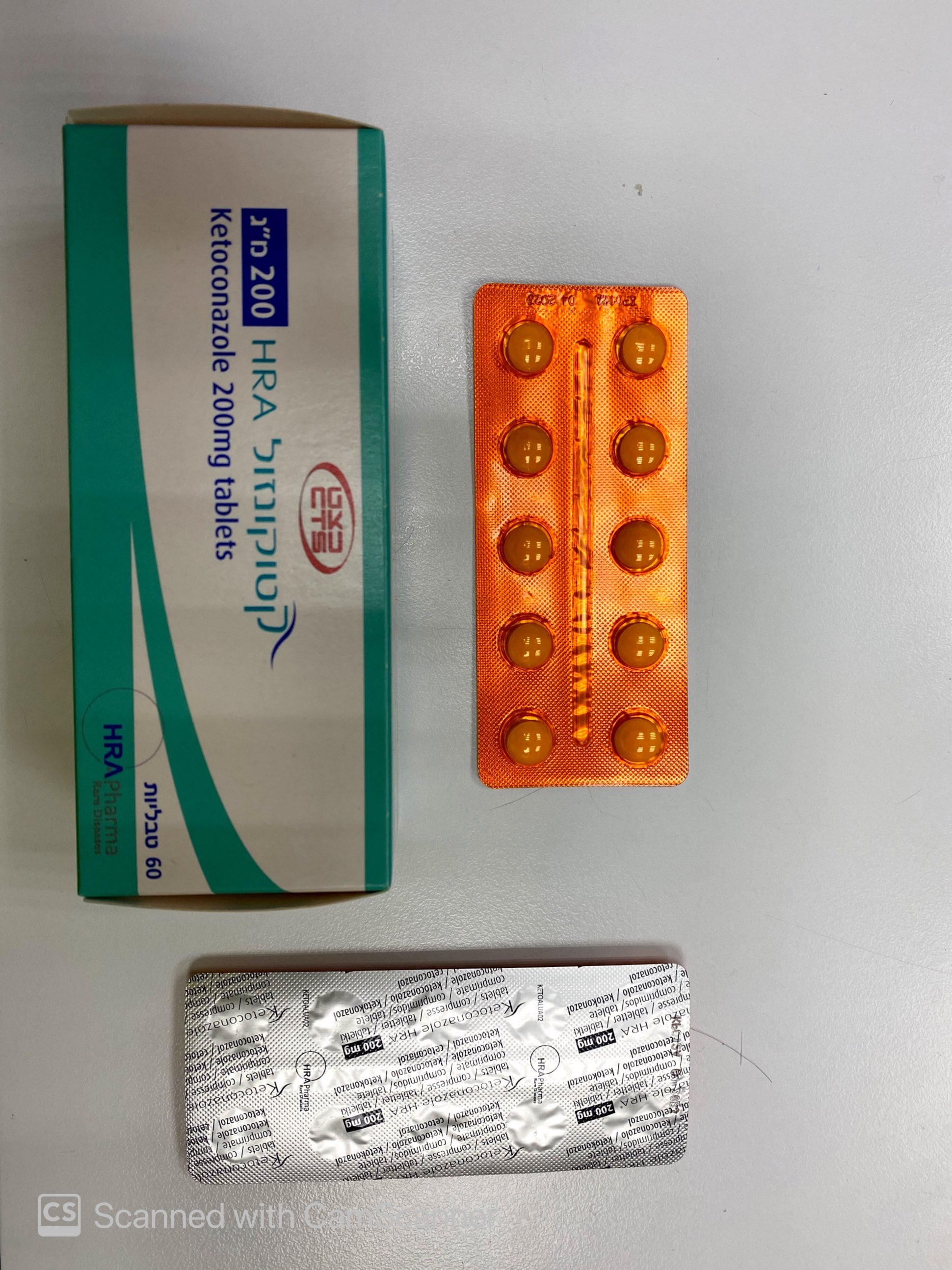Quest for the right Drug

קטוקונזול HRA 200 מ"ג KETOCONAZOLE HRA 200 MG (KETOCONAZOLE)
תרופה במרשם
תרופה בסל
נרקוטיקה
ציטוטוקסיקה
צורת מתן:
פומי : PER OS
צורת מינון:
טבליה : TABLETS
עלון לרופא
מינוניםPosology התוויות
Indications תופעות לוואי
Adverse reactions התוויות נגד
Contraindications אינטראקציות
Interactions מינון יתר
Overdose הריון/הנקה
Pregnancy & Lactation אוכלוסיות מיוחדות
Special populations תכונות פרמקולוגיות
Pharmacological properties מידע רוקחי
Pharmaceutical particulars אזהרת שימוש
Special Warning עלון לרופא
Physicians Leaflet
Special Warning : אזהרת שימוש
4.4 Special warnings and precautions for use Monitoring of liver function Liver enzymes should be monitored in all patients receiving ketoconazole. Due to the risk of serious hepatic toxicity, close follow-up of patients is required (see section 4.2). Monitoring of adrenal function Adrenal function should be monitored at regular intervals since adrenal insuficiency can occur during the treatment under conditions of a relative cortisol deficiency due to an increased glucocorticoid demand (e.g. in case of stress, surgery, or infection); and/or in case of ketoconazole overtreatment (for the patients treated with a block-only regimen); or if there is insufficient glucocorticoid replacement therapy (for the patients treated with a block-and-replace regimen). Serum or plasma and/or salivary cortisol and/or urinary free cortisol levels should be monitored, within one week following ketoconazole initiation as a minimum, and then periodically thereafter. When urinary free/serum/ plasma cortisol levels are normalised or close to target and the effective dose of ketoconazole is established, monitoring can be undertaken every 3 to 6 months (see section 4.2 for dose adjustment in case of adrenal insufficiency). All patients should be monitored and informed about the signs and symptoms associated with hypocortisolism (e.g. weakness, fatigue, anorexia, nausea, vomiting, weight-loss, hypotension, hyponatraemia, hyperkalaemia and/or hypoglycaemia). If clinical symptoms are suggestive of adrenal insufficiency, cortisol levels should be measured and Ketoconazole HRA should be temporarily discontinued or the dose reduced and if necessary corticosteroid substitution should be initiated. ketoconazole can be resumed thereafter at a lower dose (see section 4.2). Block and replace regimen Patients treated with a block-and-replace regimen should be taught to adjust their glucocorticoid replacement therapy dose under conditions of stress (see section 4.2). In addition, they should receive an emergency card and be equipped with an emergency glucocorticoid set. Monitoring of the QTc interval Monitoring for an effect on the QTc interval is advisable. An ECG should be performed: - Prior to the start of ketoconazole - Within one week after the beginning of the treatment - As clinically indicated thereafter. In case of co-administration of a medicinal product known to increase QTc interval (see section 4.5), ECG monitoring is recommended. Contraception Women must be provided with comprehensive information on pregnancy prevention. As a minimum requirement, women of childbearing potential must use an effective method of contraception (see section 4.6). Decreased gastric acidity Absorption is impaired when gastric acidity is decreased. Acid-neutralising medicines (e.g. aluminium hydroxide) should not be administered for at least 2 hours after the intake of ketoconazole. In patients with achlorhydria, such as certain AIDS patients and patients on acid secretion suppressors (e.g. H2-antagonists, proton pump inhibitors), it is advised to administer ketoconazole with an acidic beverage e.g. cola beverage, orange juice. If acid secretion suppressors are added to or removed from the concomitant medicinal products then ketoconazole dose should be adjusted according to cortisol levels. Potential interaction with medicinal products Ketoconazole has a high potential for clinically important medicinal products interactions. Ketoconazole is mainly metabolised through CYP3A4. Coadministration of potent enzyme inducers of CYP3A4 may decrease the bioavailibity of ketoconazole. A review of concomitant medicinal products should be conducted when initiating ketoconazole treatment since ketoconazole is a known strong CYP3A4 inhibitor. The SmPC for concomitantly used products must be consulted for the recommendations regarding co- administration with strong CYP3A4 inhibitors. Ketoconazole is a potent inhibitor of CYP3A4: inhibition of CYP3A4 by ketoconazole can increase patients’ exposure to a number of medicinal products which are metabolised through this enzymatic system (see section 4.5). Ketoconazole is also a potent inhibitor of P-gp: inhibition of P-gp by ketoconazole can increase patients’ exposure to medicinal products which are P-gp substrates (see section 4.5). CYP3A4-metabolised and/or P-gp substrates known to prolong the QT interval may be contraindicated or not recommended depending on the observed or expected effect with ketoconazole (i.e. resulting in augmentation of the plasma concentration, AUC, Cmax of the drugs) and the known therapeutic margins of the drugs. Some combinations may lead to an increased risk of ventricular tachyarrhythmias, including occurrences of torsade de pointes, a potentially fatal arrhythmia (see Table 1 Interactions and recommendations for co-administration, section 4.5). Use with hepatotoxic medicinal products Co-administration of ketoconazole and other medicinal products known to have potentially hepatotoxic effect (e.g. paracetamol) is not recommended since the combination may lead to increased risk of liver damage. Use with pasireotide Co-administration of ketoconazole and pasireotide is not recommended since the combination can lead to QT prolongation in patients with known cardiac rhythm disorders (see section 4.5). Coexisting inflammatory/autoimmune disorders Exacerbation or development of inflammatory/autoimmune disorders has been described after Cushing’s syndrome remission, including after treatment with ketoconazole. Patients with Cushing's syndrome and coexisting inflammatory/autoimmune disorders should be supervised after normalisation of cortisol levels on ketoconazole. Alcohol Patients should be advised against alcohol consumption while on treatment (see section 4.5). Warning regarding excipients This medicinal product contains lactose. Patients with rare hereditary problems of galactose intolerance, total lactase deficiency or glucosegalactose malabsorption should not take this medicine.
Effects on Driving
4.7 Effects on ability to drive and use machines Ketoconazole has a moderate influence on the ability to drive and use machines. Patients should be warned about the potential for dizziness and somnolence (see section 4.8) and should be advised not to drive or operate machines if any of these symptoms occur.

שימוש לפי פנקס קופ''ח כללית 1994
לא צוין
תאריך הכללה מקורי בסל
לא צוין
הגבלות
לא צוין
מידע נוסף
